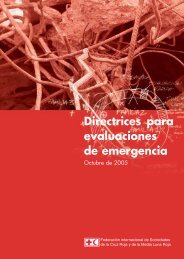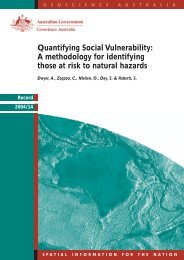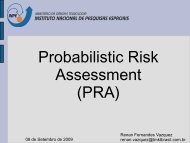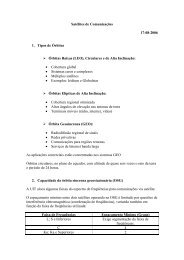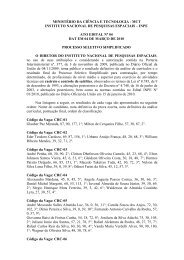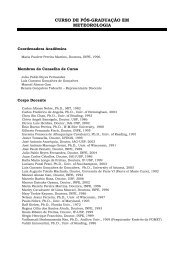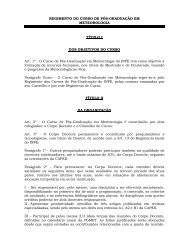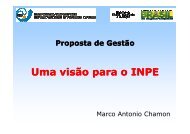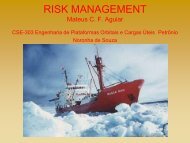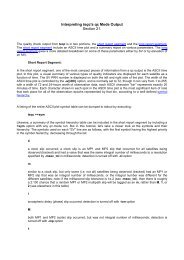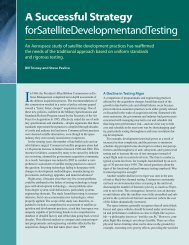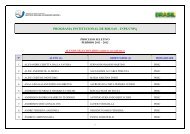Living with Risk. A global review of disaster reduction initiatives
Living with Risk. A global review of disaster reduction initiatives
Living with Risk. A global review of disaster reduction initiatives
You also want an ePaper? Increase the reach of your titles
YUMPU automatically turns print PDFs into web optimized ePapers that Google loves.
http://europa.eu.int/comm/environment/<br />
civil/prote/cpactiv/cpact05c.htm<br />
Flood and Erosion Management in Alpine<br />
River Basins.<br />
http://europa.eu.int/comm/environment/<br />
civil/prote/cpactiv/cpact05e.htm<br />
Development <strong>of</strong> rescue actions based on dambreak<br />
flood analysis (RESCDAM).<br />
http://europa.eu.int/comm/environment/<br />
civil/prote/cpactiv/cpact05h.htm<br />
Analysis <strong>of</strong> the 1993/1995 Floods in Western<br />
Europe.<br />
http://europa.eu.int/comm/environment/<br />
civil/prote/cpactiv/cpact05a.htm<br />
The European Environment Agency’s (EEA)<br />
core task is to provide decision-makers <strong>with</strong><br />
the information needed for creating sound<br />
policies to protect the environment and support<br />
sustainable development. It carries out<br />
studies on issues such as the impact <strong>of</strong> extreme<br />
hydrological <strong>disaster</strong>s in relation to Europe’s<br />
water resources. It also supports the EC in diffusing<br />
information on the results <strong>of</strong> environmental-linked<br />
research. http://org.eea.eu.int<br />
The EUR-OPA Major Hazards Agreement<br />
constitutes an open agreement on setting up<br />
cooperation in major natural and technological<br />
<strong>disaster</strong>s. It has been signed by 23 Member<br />
States <strong>of</strong> the Council <strong>of</strong> Europe. Its aim is to<br />
carry out a multidisciplinary study <strong>of</strong> the cooperation<br />
methods through political, scientific<br />
and technical activities.<br />
http://www.europarisks.coe.int<br />
Central Europe<br />
The Central European Disaster Prevention<br />
Forum (CEUDIP) was established in 1999<br />
through the joint efforts <strong>of</strong> the National Committees<br />
for the IDNDR from the Czech<br />
Policy and public commitment: the foundation <strong>of</strong> <strong>disaster</strong> risk <strong>reduction</strong><br />
Republic, Germany, Hungary, Poland and<br />
Slovakia, to continue activities <strong>of</strong> the ISDR.<br />
The specific motivation was to formulate an<br />
institutional mechanism that could increase<br />
the collaboration in <strong>disaster</strong> <strong>reduction</strong> related<br />
to all types <strong>of</strong> hazards, and particularly<br />
floods, shared among these neighbouring<br />
countries.<br />
Following the shared experience <strong>of</strong> the destructive<br />
Oder River floods early in 1999, the initial<br />
interest that stimulated the participating countries<br />
was a common desire to improve early<br />
warning capabilities both among and <strong>with</strong>in the<br />
individual countries. Other issues have emerged<br />
subsequently, such as the role <strong>of</strong> the media in<br />
<strong>disaster</strong> <strong>reduction</strong>, national legislation about<br />
declared emergencies, the participation <strong>of</strong> civil<br />
society in <strong>disaster</strong> <strong>reduction</strong> activities, and the<br />
preparation <strong>of</strong> training materials.<br />
The forum has conducted annual meetings<br />
since 1999 in Prague, Warsaw, Bratislava and<br />
Bonn. The members <strong>of</strong> CEUDIP agreed at<br />
their meeting in 2000 that closer cooperation<br />
would be required <strong>with</strong> EU policies related to<br />
civil protection and <strong>disaster</strong> <strong>reduction</strong>. As four<br />
<strong>of</strong> the CEUDIP countries are candidates for<br />
future membership in the EU, they have<br />
assigned particular relevance to assess their<br />
present capabilities.<br />
In particular, they have recognized the growing<br />
importance <strong>of</strong> strong and active participation <strong>of</strong><br />
the public, working through civic groups and<br />
other NGOs to supplement the efforts <strong>of</strong> government<br />
institutions and agencies. This<br />
approach to foster common and improved<br />
regional standards was augmented at<br />
CEUDIP’s meeting in Bratislava in 2001 when<br />
it was agreed to develop a project <strong>of</strong> cooperation<br />
<strong>with</strong> the EU institutions involved <strong>with</strong> emergencies,<br />
risk and <strong>disaster</strong> <strong>reduction</strong> issues.<br />
3<br />
139



